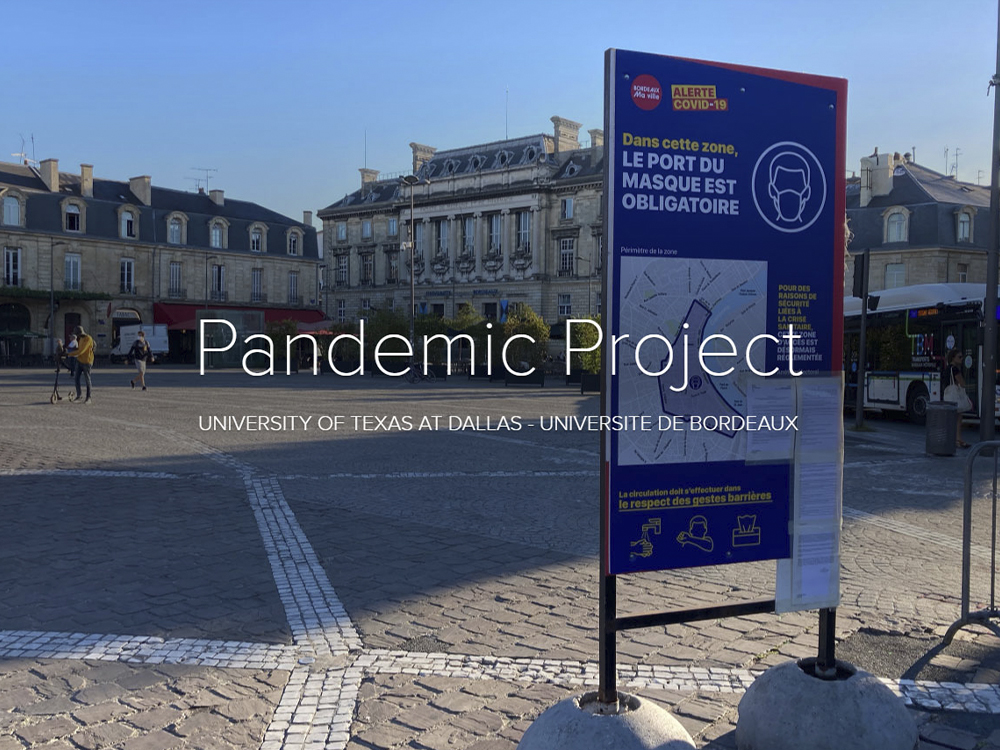Course Offers Virtual Exchange, Look at Deviant Behavior During Pandemic
03.01.2021

You can’t help but notice it. The person at the grocery store incorrectly wearing a face covering. The customers in line at the pharmacy ignoring social distancing guidelines.
Students in Dr. Carol Cirulli Lanham’s deviance course at The University of Texas at Dallas last fall turned these COVID-19 behavioral observations into a class project with the help of their peers in France through a virtual learning partnership.
As an assistant director of the Center for Teaching and Learning (CTL), Lanham is trained in virtual exchange, which partners UT Dallas students with students in another country. She said these types of courses enable the University to take students “abroad” in a sense, even though they cannot travel because of the pandemic.
“The European Union strongly supports virtual exchanges, and we are beginning to follow their lead here in the United States,” Lanham said. “Given the global scope of the pandemic and the change in social behavior that it engendered, it was a perfect topic for a field research project that I have been assigning to students since I first began teaching this course in 2012.”
For the pandemic project, 16 of Lanham’s students teamed up with 16 psychology students in an English course at the University of Bordeaux for seven weeks via Zoom and similar platforms.
Virtual exchanges also broaden access to cultural learning experiences and make global knowledge more readily available to students who cannot afford to travel abroad, said Lanham, associate professor of instruction in sociology and assistant dean of outreach and engagement in the School of Economic, Political and Policy Sciences.
 Dr. Carol Cirulli Lanham
Dr. Carol Cirulli Lanham
This semester, Lanham is teaching the course in the Hobson Wildenthal Honors College.
“Virtual exchange courses can improve students’ ability to engage with people of diverse backgrounds, convey ideas and communicate with others whose primary language is not English,” she said. “Virtual exchanges also can provide students many of the same benefits of study abroad experiences at a fraction of the cost.”
Deviant Behavior During the Pandemic
Lanham said sociologists define deviant behavior as an action that violates social norms. In some cases, it breaks the law, while in others it generates only mild public disapproval.
“When it comes to public health guidelines designed to stop the spread of COVID-19, governments are taking a variety of approaches, and while face coverings and social distancing are required in some areas, in others they are only recommended,” Lanham said.
While practicing social distancing of their own, the students observed deviant behavior in their communities at places like grocery stores and coffee shops. They noted mask wearing, social distancing and other public health measures.
In groups, they worked to determine what constitutes deviance in their particular cities and discussed patterns. Lanham said many students seemed surprised by the similar patterns of behavior in both countries. For example:
- Young people flouting the rules more often than older people.
- Improper wearing of masks, such as exposing the nose.
- General lack of mask wearing among children.
After completing their final group project, the students reflected on their experiences, challenges and lessons learned from the virtual exchange in individual videos.
Brisa Castillo, a sociology junior, said the program gave her the opportunity to examine how both the U.S. and France responded to the pandemic and how citizens from each country have been affected.
“Seeing how they lived on a day-to-day basis in France with COVID-19 rampant and how the country handled the aftermath by instating various precautions was interesting,” she said.
The experience also helped relieve the sudden onset of loneliness that Castillo said she felt at the beginning of quarantine.
“Learning about my group members in our weekly meetings helped fill the void of not having social interactions in in-person classes,” she said. “The program gave each of us an outlet to explain how we were handling quarantine and how the transition to online classes affected us. Our individual observations also helped us engage with each other and encouraged further discussion of our experiences.”
Lanham said the CTL is encouraging more faculty members to adopt the virtual exchange model so that students can have international experiences without leaving home. CTL will host workshops on virtual exchange in April for faculty in all schools.
–Brittany Magelssen
Tags: CTL, Dr. Carol Cirulli Lanham, EPPS